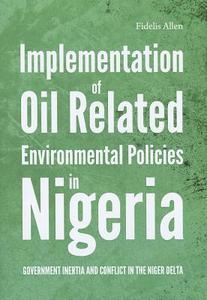Implementation of Oil Related Environmental Policies in Nigeria: Government Inertia and Conflict in the Niger Delta
By : Fidelis Allen
Release date: Jan 2012
Cambridge Scholars Publishing
Number of pages: 210
ISBN: 978-1-4438-3442-1


Fidelis Allen situates violent conflict in the Niger Delta in the context of failure by government to effectively implement relevant oil-related environmental policies intended to achieve sustainable development, arguing that oil and environment-related conflicts in the region are reflections of this failure. This failure is premised on the notion that the goal of sustainable development, as clearly outlined in Nigeria’s National Environmental Policy and implied in various other policies, can be pursued through the activities of government, individuals and business organisations that are capable of engendering economic and social progress for communities that depend on the environment for their survival. In fact, available evidence shows that government and oil company activities (or failures to act) actually contribute to the despoliation of the environment in the Niger Delta. Despite existing environmental legislations and guidelines, unsafe waste disposal, flaring of gas and oil spillage remain key features of oil industry operations in the Niger Delta. Not surprisingly, the book highlights a lack of synergy between government and oil company activities, and the attainment of sustainable development as a key goal of the environmental policy of the government. In other words, the activities of the government and oil companies do not sufficiently promote sustainable development. The net consequence is reflected in the frustrations of local justice and environmental movement groups about the political processes which deter (rather than enable) their agitation for improvements in local living conditions and development in the Niger Delta. Over time, those frustrations begin to manifest at different levels, including aggressive and violent behaviours against oil companies and government security agencies for their contributory roles.
The author, Fidelis Allen, who obtained his PhD in Political Science from the University of KwaZulu-Natal in Pietermaritzburg, South Africa, is currently researching into environmental movement politics in Durban and the Niger Delta, in the School of Built Environment and Development Studies’ Centre for Civil Society at the same university. He has published in local and international journals, and is a contributor to several chapters in edited books.
“This book exposes the limits of a neo-colonial state whose governing elite is so individualistic and self-serving, that they abandon the common good. Allen’s book is a worthy reminder that laws by themselves mean nothing outside ethics and values. I heartily recommend the book to all those concerned about the crisis of underdevelopment in Africa.”
– Professor Abubakar Momoh, Lagos State University
“Why is the Niger Delta one of the richest and yet one of the most polluted places on earth? Read this book. Feel the impunity. Understand the rage. Through this book, communities, government and oil companies should see where they stand in the murky waters of the Niger Delta. Everyone must decide whether to further muddy the waters or join the struggle for urgent, radical transformation.”
– Nnimmo Bassey, author of To Cook a Continent: Destructive Extraction and the Climate Crisis in Africa











